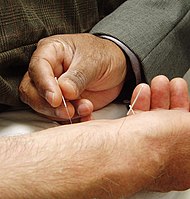
Photo from wikipedia
INTRODUCTION: Anxiety and depression are major drivers of health-related quality of life, adherence to therapy, and motivation to self-manage chronic conditions. A number of studies have shown rates of anxiety… Click to show full abstract
INTRODUCTION: Anxiety and depression are major drivers of health-related quality of life, adherence to therapy, and motivation to self-manage chronic conditions. A number of studies have shown rates of anxiety and depression to be higher among individuals with hemophilia compared to that of the general population (1). As the primary point of care for persons with hemophilia, hematologists are well-placed to assess the mental health state of their patients (2). The aim of this study is to explore physician- and patient-reported rates of anxiety and depression among a cohort with severe hemophilia. METHODS: Data were drawn from the Cost of Haemophilia across Europe – a Socioeconomic Survey (CHESS), a cost-of-illness study in severe hemophilia A and B across five European countries (France, Germany, Italy, Spain, and the UK) (3). Physicians provided clinical and sociodemographic information for 1,285 adult patients, 551 of whom completed corresponding questionnaires, including EuroQol EQ-5D-3L. We compared the self-reported EQ-5D with physician reports of anxiety and depression. RESULTS: Across the five countries, physicians recorded a diagnosis of anxiety disorder in 189 patients (15 percent; range 4 percent-28 percent) and depression in 178 patients (14 percent; range 10 percent-28 percent). Seventy-three patients (6 percent) recorded comorbid anxiety and depression. Forty-six percent of patients with anxiety and 58 percent of patients with depression were receiving some form of treatment for their condition. Within the EQ-5D measure, 42 percent of individuals recorded problems with anxiety or depression, with 6 percent of patients reporting “extreme” anxiety or depression. Twenty-two percent of individuals with a self-reported problem were not recorded with a corresponding diagnosis by their hematologist; 39 percent of patients reporting “extreme” anxiety or depression were absent of any physician-reported diagnosis. CONCLUSIONS: Anxiety and depression are notable conditions within the hemophilia community, particularly so among those with severe condition. The mental health of individuals with hemophilia is an important aspect in ensuring therapy adherence and overall wellbeing and should be considered as part of a multidisciplinary approach to management of the condition.
Journal Title: International Journal of Technology Assessment in Health Care
Year Published: 2017
Link to full text (if available)
Share on Social Media: Sign Up to like & get
recommendations!